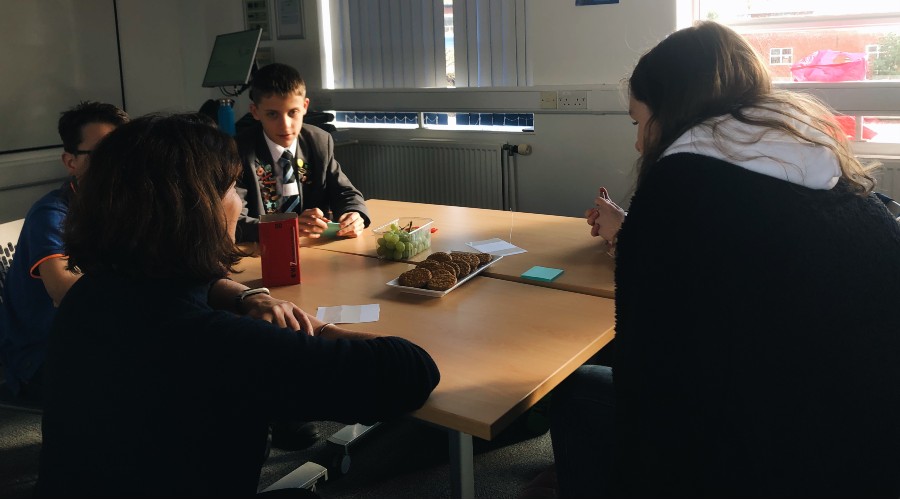- Interesting for you
- My settings


Health Research Methods
This Health Research Methods MSc programme from The University of Exeter has been designed to give you the skills and knowledge to enact meaningful change and gain a comprehensive grounding in health services research methods as a platform for developing a career as a health researcher.

Within this Health Research Methods MSc programme from The University of Exeter you will be taught by the leading international experts and authors in complex interventions research methods.
Topics such as patient and public involvement, collaborative working, evidence-based practice, complex interventions, health economics, clinical trials and medical statistics will provide a common thread that runs throughout the programme.
Previous topics that students have chosen for independent study include:
- Exploring facilitators and barriers of patients’ trust in clinical pharmacists in Primary Care.
- Improving the physical health monitoring of patients taking Clozepine.
- Intravenous antimicrobial therapy in the home.
- Effectiveness of group psychological interventions in reducing the burden for caregivers of patients with dementia residing in the community.
Career opportunities:
This Health Research Methods programme from The University of Exeter is designed for a wide range of participants. It will enable health professionals from a variety of disciplines to gain expertise and become a more effective and confident practitioner. It is suitable for health researchers, academic clinical fellows, nurses, midwives, allied healthcare professionals and public health professionals.
It is also suitable for new graduates (e.g. Medical Science, Psychology, Sociology, Geography) who wish to gain a comprehensive grounding in health services research methods as a platform for developing a career as a health researcher.
Get more details
Programme structure.
Courses include:
- Research Design
- Systematic Reviews for Policy and Practice
- Statistics as Applied to Health
- Independent Research (HRM and EM)
- Extended Independent Research
- Qualitative Methods and Process Evaluations
- Clinical Trials
- Health Economics
Check out the full curriculum
Key information.
- 12 months
2 or 3 years
Start dates & application deadlines
- Apply before 2025-08-30 00:00:00 , International The deadline is applicable to students from outside the European Economic Area who want to study within the EEA, or to students who want to study outside the EEA but are not nationals of that country. ">
- Apply before 2025-09-18 00:00:00 , National The deadline applies if you have the same nationality as the university. ">
Maximise your IELTS score with the British Council! Sign up for free and get access to free mock tests, training videos and webinars with IELTS Ready.
Disciplines
Explore more key information, academic requirements, english requirements, student insurance.
Make sure to cover your health, travel, and stay while studying abroad. Even global coverages can miss important items, so make sure your student insurance ticks all the following:
- Additional medical costs (i.e. dental)
- Repatriation, if something happens to you or your family
- Home contents and baggage
We partnered with Aon to provide you with the best affordable student insurance, for a carefree experience away from home.
Starting from €0.53/day, free cancellation any time.
Remember, countries and universities may have specific insurance requirements. To learn more about how student insurance work at The University of Exeter and/or in United Kingdom, please visit Student Insurance Portal .
Other requirements
General requirements.
- Normally a minimum 2.2 Honours degree (or equivalent) in a relevant discipline. Relevant clinical or professional experience may be taken into consideration as evidence of equivalency.
- A personal statement, detailing your reasons for seeking to undertake this subject, will be required.
Make sure you meet all requirements
Tuition fee, international.
UK fees per year:
- MSc : £5,800 part-time 2 year, £3,900 part-time 3 year
- MSc: £13,750 part-time 2 year, £9,250 part-time 3 year
Living costs for Exeter
The living costs include the total expenses per month, covering accommodation, public transportation, utilities (electricity, internet), books and groceries.
Embark on your journey with the Studyportals Scholarship! We're giving away a total of 20,000 euros to help you achieve your dream of studying abroad.
Check for any work restrictions
In order for us to give you accurate scholarship information, we ask that you please confirm a few details and create an account with us.
Scholarships Information
Below you will find Master's scholarship opportunities for Health Research Methods.
Available Scholarships
You are eligible to apply for these scholarships but a selection process will still be applied by the provider.
Read more about eligibility
- missing or incomplete ?"> Missing or incomplete content
- wrong or outdated ?"> Wrong or outdated content
Other interesting programmes for you
Our partners.
Check the official website for even more information about this programme.
Go to your profile page to get personalised recommendations!
- Home »
- University of Exeter »
- Health and Community Sciences »
- Health Research Methods
find your perfect postgrad program Search our Database of 30,000 Courses
University of exeter: health research methods.
| Institution | |
|---|---|
| Department | |
| Web | https://www.exeter.ac.uk |
| Study type | Taught |
The global burden of disease and challenges of safe and accessible health services means that more than ever we need to be developing, testing, evaluating and implementing evidence-based healthcare in highly complex situations.
This programme has been designed to give you the skills and knowledge to enact meaningful change and gain a comprehensive grounding in health services research methods as a platform for developing a career as a health researcher.
It is suitable for those from a wide variety of backgrounds including:
Science, mathematics and social science graduates
Medical researchers
Academic clinical fellows
Allied healthcare
Healthcare professionals wishing to develop their research skills
You will be taught by the leading international experts and authors in complex interventions research methods. Topics such as patient and public involvement, collaborative working, evidence-based practice, complex interventions, health economics, clinical trials and medical statistics will provide a common thread that runs throughout the programme.
Previous topics that students have chosen for independent study include:
Exploring facilitators and barriers of patients’ trust in clinical pharmacists in Primary Care.
Improving the physical health monitoring of patients taking Clozepine.
Intravenous antimicrobial therapy in the home.
Effectiveness of group psychological interventions in reducing the burden for caregivers of patients with dementia residing in the community.
To learn more about modules, assessment methods, facilities and our staff research expertise please visit our course page.
Full-Time, 1 years starts Sep 2025
| Level | RQF Level 7 |
|---|---|
| Entry requirements | Normally a minimum 2.2 Honours degree (or equivalent) in a relevant discipline. Relevant clinical or professional experience may be taken into consideration as evidence of equivalency. A personal statement, detailing your reasons for seeking to undertake this subject, will be required. Please visit the entry requirements section of our website for equivalencies from your country and further information on English language requirements. Please visit our international equivalency pages to enable you to see if your existing academic qualifications meet our entry requirements. International students are normally subject to visa regulations which prevent part-time study. It is recommended that international students apply for the level of the final award you intend to complete i.e. PGCert, PGDip or Masters, due to the associated cost and requirements for a Tier 4 student Visa. Accreditation of prior learning for Masters courses in Healthcare and Medicine For full details, including English language requirements and international equivalencies, please visit our course page. |
| Location | University of Exeter - St Luke's Campus Heavitree Road Exeter Devon EX1 2LU |
Part-Time, 2 years starts Sep 2025
Part-time, 3 years starts sep 2025, full-time, 1 years started sep 2024, part-time, 2 years started sep 2024, part-time, 3 years started sep 2024, full-time, 1 years started sep 2023, part-time, 2 years started sep 2023, part-time, 3 years started sep 2023, postgraduate certificate - pgcert, postgraduate diploma - pgdip, full-time, 2 years starts sep 2025, full-time, 2 years started sep 2024, full-time, 2 years started sep 2023.
Not what you are looking for?
Postgraduate Bursary Opportunity with Postgrad.com
Are you studying as a PG student at the moment or have you recently been accepted on a postgraduate program? Apply now for one of our £2000 PGS bursaries.

Exclusive bursaries Open day alerts Funding advice Application tips Latest PG news
Complete Our Destination Survey

Take 2 minutes to complete our Destination Survey for the chance to win a Postgrad Study Bursary worth £2,000.
All we need to know is:
- Your university
- Your PG course
Our cookies
We use cookies for three reasons: to give you the best experience on PGS, to make sure the PGS ads you see on other sites are relevant , and to measure website usage. Some of these cookies are necessary to help the site work properly and can’t be switched off. Cookies also support us to provide our services for free, and by click on “Accept” below, you are agreeing to our use of cookies .You can manage your preferences now or at any time.
Privacy overview
We use cookies, which are small text files placed on your computer, to allow the site to work for you, improve your user experience, to provide us with information about how our site is used, and to deliver personalised ads which help fund our work and deliver our service to you for free.
The information does not usually directly identify you, but it can give you a more personalised web experience.
You can accept all, or else manage cookies individually. However, blocking some types of cookies may affect your experience of the site and the services we are able to offer.
You can change your cookies preference at any time by visiting our Cookies Notice page. Please remember to clear your browsing data and cookies when you change your cookies preferences. This will remove all cookies previously placed on your browser.
For more detailed information about the cookies we use, or how to clear your browser cookies data see our Cookies Notice
Manage consent preferences
Strictly necessary cookies
These cookies are necessary for the website to function and cannot be switched off in our systems.
They are essential for you to browse the website and use its features.
You can set your browser to block or alert you about these cookies, but some parts of the site will not then work. We can’t identify you from these cookies.
Functional cookies
These help us personalise our sites for you by remembering your preferences and settings. They may be set by us or by third party providers, whose services we have added to our pages. If you do not allow these cookies, then these services may not function properly.
Performance cookies
These cookies allow us to count visits and see where our traffic comes from, so we can measure and improve the performance of our site. They help us to know which pages are popular and see how visitors move around the site. The cookies cannot directly identify any individual users.
If you do not allow these cookies we will not know when you have visited our site and will not be able to improve its performance for you.
Marketing cookies
These cookies may be set through our site by social media services or our advertising partners. Social media cookies enable you to share our content with your friends and networks. They can track your browser across other sites and build up a profile of your interests. If you do not allow these cookies you may not be able to see or use the content sharing tools.
Advertising cookies may be used to build a profile of your interests and show you relevant adverts on other sites. They do not store directly personal information, but work by uniquely identifying your browser and internet device. If you do not allow these cookies, you will still see ads, but they won’t be tailored to your interests.
MSc Health Research Methods
University of exeter, different course options.
- Key information
Course Summary
Tuition fees, entry requirements, similar courses at different universities, key information data source : idp connect, qualification type.
MSc - Master of Science
Subject areas
Health Studies
Course type
Develop the skills and knowledge needed to enact meaningful change as an effective and confident healthcare practitioner.
Designed for health researchers, academic clinical fellows, nurses, midwives, allied healthcare professionals and public health professionals.
Also suitable for new graduates seeking a comprehensive grounding in health services research methods to develop your career as a health researcher.
Study topics such as patient and public involvement, collaborative working, evidence-based practice, complex interventions, health economics, clinical trials and medical statistics.
Taught by leading international experts and authors in complex interventions research methods.
Play a vital role in making health services better. Constant changes in healthcare means that highly skilled researchers are in-demand for developing, testing, evaluating and implementing evidence-based healthcare in highly complex situations.
By studying MSc Health Research Methods, you could help solve important problems to deliver better, safer and more accessible healthcare to the population.
Previous topics that students have chosen for independent study include:
Exploring facilitators and barriers of patients’ trust in clinical pharmacists in Primary Care.
Improving the physical health monitoring of patients taking Clozepine.
Intravenous antimicrobial therapy in the home.
Effectiveness of group psychological interventions in reducing the burden for caregivers of patients with dementia residing in the community.
This programme is designed for a wide range of participants. It will enable health professionals from a variety of disciplines to gain expertise and become a more effective and confident practitioner. It is suitable for health researchers, academic clinical fellows, nurses, midwives, allied healthcare professionals and public health professionals. It is also suitable for new graduates (e.g. Medical Science, Psychology, Sociology, Geography) who wish to gain a comprehensive grounding in health services research methods as a platform for developing a career as a health researcher.
UK fees Course fees for UK students
For this course (per year)
International fees Course fees for EU and international students
Normally a minimum 2.2 Honours degree (or equivalent) in a relevant discipline. Relevant clinical or professional experience may be taken into consideration as evidence of equivalency.
MSc Advanced Professional Practice in Occupational Therapy
University of plymouth, pgcert clinical education, mclined clinical education, msc advanced professional practice in physiotherapy, msc advanced professional practice in dietetics.
Where to start
- Ultimate Guides
- Virtual Work Experiences
- Chat to students
- UCAS events
- Apprenticeships
Subject guides
- Subject tasters
Industry guides
Where to go.
- Universities and colleges
City guides
- Types of employment
- Write a cover letter
- Starting work
- Career quiz
Before you apply
- Campus open days
- What and where to study
- Distance learning
- Higher Technical Qualifications (HTQs)
- Studying at a college
- Pros and cons of university
Applying to university
- Dates and deadlines
Personal statement
- UCAS Tariff points
- Individual needs
After applying
- Track your application
- Decisions and offers
Results day
Clearing and results day, conservatoires.
- Fees and finance
How to apply
Replying to offers.
- Tracking your application
Postgraduate
- Choosing a course
- Fees, loans, and funding
- Teacher training
- International students
- Student finance
- Scholarships, grants, and bursaries
Additional funding
- Managing money
- Student discounts
Student life
- Starting uni or college
- Mental health and wellbeing
Accommodation
- Accommodation for apprentices
- Accommodation for disabled students
- Apply for student accommodation
- Find the right accommodation
- The ultimate packing list
- Visas and immigration
- English Language Tests (ELTs)
- Choosing the right course
Entry requirements
- International clearing guide
Financial information
- Available finance options
- Saving money
- UK bank accounts
- Support for refugees and asylum seekers
Extra support
- Adjusting to the UK
- Application tips
- Available support
- Checklist for moving to the UK
- International FAQs
- Support organisations
Student recruitment and marketing
- Drive applications through Clearing
- Drive applications through Extra
- Exhibiting as a university or college
- Improve conversions
- Improve your competitive strategy
- Increase brand awareness
- International
- Provider pages
Data products and solutions
- Application and decision tracker
- Competitor insight dashboard
- Course feasibility
- Leaky Hosepipe solution
- Outreach Elevator
- Student decision report
- Untapped Geographies
Managing applications
- Availability of UCAS data
- Fraud and similarity
- HESA return
- Link services
- Record of Prior Acceptance (RPA)
- Results Processing Service (ABL)
- Systems and services guides
Qualification Information Services
- Qualification Information Profiles (QIPs)
- Qualification guides and resources
- UCAS Tariff
Products as part of your membership
- Recruitment, marketing and admissions services
Provider news and updates
- UCAS correspondents bulletin
Provider developments
- Upcoming developments
- Previous updates
- UCAS maintenance schedule
- Service status
Test and training environments
- HEP1 and HEP2
Link product development
- Availability of new features
- UCAS Link API strategy
- Groups and forums
Admissions guides and resources
- Conservatoire admissions guide and resources
- Provider contact types
- Undergraduate admissions guide and resources
Good practice
- Admissions policies
- Admissions processes
- Applicant experience
- Collection tool help
- Contextualised admissions
- Equality and diversity
- Supporting disadvantages and under-represented groups
- Unconditional offers
- Widening access and participation
Online learning
Provider engagement.
- Annual provider update
Adviser news
- Adviser portal
- Key dates timeline
- Newsletters
- Adviser lives
- Qualification reform
Discovery events
- Getting ready for UCAS Discovery
- Events training
Create your future events
Conferences.
- Teacher and adviser conference 2024
- International Teachers and Advisers Conference
Events calendar 2024
Cycle toolkits.
- Adviser 2025 toolkit
- Conservatoire application toolkit
- Supporting students with individual needs
Lesson activities
- Classroom resources
- Lesson plans
Develop your adviser skills
- Practical ways to guide students
- Help finding work experience
- Events and summer school
- Positive career discussions
- Advice about GCSE choices
Online training
- Personal development platform
- Adviser tips
Tools and resources
- UCAS hub guide
- Digital training
- Progression pathways
Pre application support
- Bursaries, scholarships, and financial support
- Help writing personal statements
- Student budget planner
- Alternatives to A Levels
- Higher education options
Application overview
- Application deadlines
- Application process
- Exam results process
- Monitor student progression
- Predicted grades
- Undergraduate references 2024
- Reference processes and terminology
- Conservatoire references
UCAS registered centres
- Becoming a UCAS registered centre
- Getting started
- Teachers and advisers
International advisers
- Clearing guide for international students
- Qualifications advice
- Supporting international students
Confirmation and Clearing
- ACSL guidance
- Clearing essentials
- Conservatoires confirmation
- International students guide
- Reach talent and acquisition
Apprentices with UCAS
Career finder, employer profiles, multichannel campaigns, apprentices, international guides, make the most of clearing, smart financial decisions, filling in your application, making changes to your application, how to get a reference, results process, application cancellation request form.
- Requests for personal data
- Notifications
- Preferences
- Provider Homepage
- Provider Dashboard
- Student Hub
- Adviser Homepage
- Adviser Portal
Courses, apprenticeships, information guides and more

University of Exeter
Degree level: postgraduate, health research methods (taught), course options.
There are other course options available which may have a different vacancy status or entry requirements – view the full list of options
Course summary
The global burden of disease and challenges of safe and accessible health services means that more than ever we need to be developing, testing, evaluating and implementing evidence-based healthcare in highly complex situations. This programme has been designed to give you the skills and knowledge to enact meaningful change and gain a comprehensive grounding in health services research methods as a platform for developing a career as a health researcher. It is suitable for those from a wide variety of backgrounds including:
- Science, mathematics and social science graduates
- Medical researchers
- Academic clinical fellows
- Allied healthcare
- Healthcare professionals wishing to develop their research skills
- Exploring facilitators and barriers of patients’ trust in clinical pharmacists in Primary Care.
- Improving the physical health monitoring of patients taking Clozepine.
- Intravenous antimicrobial therapy in the home.
- Effectiveness of group psychological interventions in reducing the burden for caregivers of patients with dementia residing in the community.
- To learn more about modules, assessment methods, facilities and our staff research expertise please visit our course page.
For a full list of compulsory and optional modules please visit our course page.
Assessment method
Please visit our course page for current assessment methods.
International applicants
Our International Student Support can help you with what you need to do before you arrive and when you get here as a new international student. They offer ongoing support throughout your studies whether that be setting up a bank account or arranging healthcare. Our Global Chums Buddy Scheme and our Intercultural Cafe provide opportunities to meet staff and connect with students. INTO University of Exeter provide pre-sessional English courses for international students as well as free insessional support. For more information about entry requirements, bursaries and scholarships and how to apply please visit our course page.
Normally a minimum 2.2 Honours degree (or equivalent) in a relevant discipline. Relevant clinical or professional experience may be taken into consideration as evidence of equivalency. A personal statement, detailing your reasons for seeking to undertake this subject, will be required. Please visit the entry requirements section of our website for equivalencies from your country and further information on English language requirements. Please visit our international equivalency pages to enable you to see if your existing academic qualifications meet our entry requirements. International students are normally subject to visa regulations which prevent part-time study. It is recommended that international students apply for the level of the final award you intend to complete i.e. PGCert, PGDip or Masters, due to the associated cost and requirements for a Tier 4 student Visa. Accreditation of prior learning for Masters courses in Healthcare and Medicine Accreditation of Prior Learning (APL) is a process whereby students, who have already gained relevant skills and knowledge prior to the start of their course, may be granted a partial credit exemption from their programme instead of unnecessarily repeating work. Please visit our website to find out more about APL. For full details, including English language requirements and international equivalencies, please visit our course page.
Fees and funding
Tuition fees.
No fee information has been provided for this course
Tuition fee status depends on a number of criteria and varies according to where in the UK you will study. For further guidance on the criteria for home or overseas tuition fees, please refer to the UKCISA website .
Additional fee information
Sponsorship information.
We invest heavily in scholarships for talented prospective Masters students. This is in addition to the UK Government’s Postgraduate Loan Scheme. For information on how you can fund your postgraduate degree at the University of Exeter, please visit our course page.
Provider information
Visit our website
University of Exeter Northcote House The Queen's Drive Exeter EX4 4QJ
Course contact details
Postgraduate admissions.
[email protected]
0300 555 60 60
Faculty of Health and Life Sciences Enquiries
+44 (0)1392 727272
5 Course options
Please select a course option to view the information for the course
| Duration | ||||||
|---|---|---|---|---|---|---|
| University of Exeter - St Luke's Campus | Full-time | 2 years | September 2025 | Please speak to the provider to make an application | ||
| University of Exeter - St Luke's Campus | Part-time | 2 years | September 2025 | Please speak to the provider to make an application | ||
| University of Exeter - St Luke's Campus | Full-time | 1 year | September 2025 | Please speak to the provider to make an application | ||
| University of Exeter - St Luke's Campus | Part-time | 3 years | September 2025 | Please speak to the provider to make an application | ||
| University of Exeter - St Luke's Campus | Full-time | 1 year | September 2025 | Please speak to the provider to make an application |
Where do you live?
Sort by furthest to nearest.
- News and articles
- Find us Find nearest IDP offices IDP Australia IDP Bahrain IDP Bangladesh IDP Cambodia IDP Canada IDP China IDP Egypt IDP Ghana IDP Hong Kong IDP India IDP Indonesia IDP Iran IDP Jordan IDP Kenya IDP Korea IDP Kuwait IDP Lebanon IDP Malaysia IDP Mauritius IDP Middle East IDP Nepal IDP New Zealand IDP Nigeria IDP Oman IDP Pakistan IDP Philippines IDP Saudi Arabia IDP Singapore IDP Sri Lanka IDP Taiwan IDP Thailand IDP Turkey IDP UAE IDP Vietnam IDP Corporate
- Where we operate
- Africa IDP Egypt IDP Ghana IDP Kenya IDP Nigeria
- Europe IDP Turkey
- Middle East IDP Bahrain IDP Iran IDP Jordan IDP Kuwait IDP Lebanon IDP Middle East IDP Oman IDP Pakistan IDP Saudi Arabia IDP UAE
- North America IDP Canada
- North Asia IDP Hong Kong IDP Korea IDP Taiwan
- Oceania IDP Australia IDP New Zealand
- South Asia IDP Bangladesh IDP India IDP Mauritius IDP Nepal IDP Sri Lanka
- South East Asia IDP Cambodia IDP Indonesia IDP Malaysia IDP Philippines IDP Singapore IDP Thailand IDP Vietnam
- New Zealand
United Kingdom
- United States
- Courses by subject
- Scholarships
- Vocational (VET)
- University Preparation
- Undergraduate
- Postgraduate and Masters
- History of IDP
- Frequently asked Questions
- Arrival services
- Money transfer
- Student health cover
- Student banking
- Accommodation
- Find nearest IDP offices
- IDP Australia
- IDP Bahrain
- IDP Bangladesh
- IDP Cambodia
- IDP Hong Kong
- IDP Indonesia
- IDP Lebanon
- IDP Malaysia
- IDP Mauritius
- IDP Middle East
- IDP New Zealand
- IDP Nigeria
- IDP Pakistan
- IDP Philippines
- IDP Saudi Arabia
- IDP Singapore
- IDP Sri Lanka
- IDP Thailand
- IDP Vietnam
- IDP Corporate
- IDP Education /
- Colleges and Universities /
- United Kingdom /
- University of Exeter /
MSc Health Research Methods
- University of Exeter

At UNIVERSITY OF EXETER
Qualification
- Masters Degree (Taught)
Next intake
23 September 2024
Entry Score
About the course
The global burden of disease and challenges of safe and accessible health services means that more than ever we need to be developing, testing, evaluating and implementing evidence-based healthcare in highly complex situations. This programme has been designed to give you the skills and knowledge to enact meaningful change and gain a comprehensive grounding in health services research methods as a platform for developing a career as a health researcher. It is suitable for those from a wide variety of backgrounds including: Science, mathematics and social science graduates Medical researchers Academic clinical fellows Nurses Allied healthcare Healthcare professionals wishing to develop their research skills You will be taught by the leading international experts and authors in complex interventions research methods. Topics such as patient and public involvement, collaborative working, evidence-based practice, complex interventions, health economics, clinical trials and medical statistics will provide a common thread that runs throughout the programme.
- Scholarships View all scholarships
- Internships
Start dates and prices
Course fees are indicative and should be used as a guide. to get an accurate price.
Duration: 1 Year (s)
Fees: GBP 27500
| Location | |
|---|---|
| Autumn (September), 2024 | |
| Autumn (September), 2025 | |
| Autumn (September), 2025 | |
| Autumn (September), 2026 | |
| Autumn (September), 2024 |
How to apply
Entry requirements for university of exeter, application deadline.
The application deadline isn't available Speak to an IDP counsellor for more detailed information
Further information
If you aren't eligible for the above entry requirements, you might ant to explore pathway options at University of Exeter . If you want to find out more, speak to our counsellors.
Career outcomes
Pathway options to study at this institution
Reviews and rankings
The world ranking.
177 th / 1250
15 th / 130
What our students think
We’ve haven’t received any reviews for this institution yet.
More about University of Exeter
Calculate your cost of living in
Recommended for you
- Scholarship
- THE World Ranking:301
- Dundee , United Kingdom
- Next intake:09/2024
- Entry Score: IELTS 6.5
- GBP20900 (2024)
- THE World Ranking:401
- Masters Degree (Research)
- Plymouth , United Kingdom
- Next intake:10/2024
- GBP17170 (2024)
- Next intake:01/2026
- THE World Ranking:1001
- Graduate Certificate
- Sheffield , United Kingdom
- Entry Score: IELTS 7.0
- GBP15000 (2024)
- THE World Ranking:177
- Exeter , United Kingdom
- GBP1667 (2024)
- THE World Ranking:101
- Graduate Diploma
- Birmingham , United Kingdom
- GBP19560 (2024)
Your action plan
Shortlist your courses.
Choose the best three courses you’re most likely to pursue.
Check your eligibility
Get an instant in-principle offer for courses with the IDP FastLane tag.
Apply through IDP Live
Fill out the form once and use it to apply to multiple courses.
How does IDP FastLane work?
With the FastLane 'Offer in Principle', you'll know in minutes if you'll be accepted!
Select an institution and course
Create your academic profile
Submit your application for an 'Offer in Principle'
Your chosen institution(s) will send you a decision in minutes!
Get ready to apply with an expert counsellor
- FindAMasters
- Masters Courses
- Search Masters Degrees
Health Research Methods MSc/PgDip/PgCert
University of exeter public health and sport sciences, findamasters summary.
Embark on a transformative journey with the Health Research Methods MSc/PgDip/PgCert at the University of Exeter. This programme equips you with the skills to drive change in healthcare through evidence-based research. Delve into topics like patient involvement, health economics, and clinical trials under the guidance of leading experts. Tailored for diverse backgrounds, from science to healthcare professionals, this course offers a comprehensive understanding of complex interventions. Choose from a range of modules, each designed to enhance your research capabilities and critical thinking. With options to exit with a PGCert or PGDip, or pursue a full Masters degree, flexibility is at your fingertips. Benefit from one-to-one tutorials, personalised support, and access to the Career Zone for future opportunities. Join us to become a confident health researcher and make a tangible impact on global health challenges. Are you ready to shape the future of healthcare?

About the course
The global burden of disease and challenges of safe and accessible health services means that more than ever we need to be developing, testing, evaluating and implementing evidence-based healthcare in highly complex situations.
This programme has been designed to give you the skills and knowledge to enact meaningful change and gain a comprehensive grounding in health services research methods as a platform for developing a career as a health researcher.
It is suitable for those from a wide variety of backgrounds including:
Entry Requirements
Normally a minimum 2.2 Honours degree (or equivalent) in a relevant discipline. Relevant clinical or professional experience may be taken into consideration as evidence of equivalency. A personal statement, detailing your reasons for seeking to undertake this subject, will be required. Applicants are also required to meet our English language requirements. Please see our website for details.
For current programme fees please see our website.
Course Content
Register your interest for this course
The university will respond to you directly. You will have a FindAMasters account to view your sent enquiries and receive email alerts with new Masters opportunities and guidance to help you choose the right course.
It looks like you alredy have a FindAMasters Account
Log in to save time sending your enquiry and view previously sent enquiries
What would you like more information about? Optional
Which subjects are you interested in studying, which age group are you optional.
The information you submit to University of Exeter will only be used by them or their data partners to deal with your enquiry, according to their privacy notice . For more information on how we use and store your data, please read our privacy statement .
Please correct the errors indicated below to send your enquiry
Chat to a student ambassador.
Our student ambassadors are the best people to tell you about what studying at University of Exeter is like.

Where will I study?

University of Exeter
A Masters at the is a great way to gain a competitive edge in your field or gain specialist training in a particular subject area. At Exeter we combine teaching excellence and high levels of student satisfaction with world class research. A member of the Russell Group, our success is built on a strong partnership with our students and a clear focus on high performance. We are the fastest growing research-intensive university in the UK and 98 per cent of our research was rated as international or world-leading quality in the last national Research Excellence Framework.
Where is University of Exeter
All available videos:.

Scholarships
Postgraduate funding.
We’ve provided the information on our website to help you get started on finding funding opportunities that are available to you: https://www.exeter.ac.uk/study/funding/
Eligibility
We recommend you start looking as early as possible for funding, especially if you will need financial assistance to undertake a postgraduate course. There are a number of ways to fund postgraduate study including: scholarships, studentships, wages, bursaries, savings, inheritance, and, increasingly, alternative methods such as crowdfunding and philanthropy. The options available may depend on your fee status or other criteria.
Application Procedure
See our website for details of funding available and how to apply : https://www.exeter.ac.uk/study/funding/
Find out more

Based on your current searches we recommend the following search filters
Check out our other Masters Courses in Exeter , United Kingdom
Check out our other Masters Courses in Medicine
Start a new search with our database of over 23,000 Masters Courses
Based on your current search criteria we thought you might be interested in these
Postgraduate Certificate in Qualitative Health Research Methods University of Oxford
Health Research Methods - MSc/PGDip/PGCert University of Birmingham
MSc/PGDip Health Care Research Methods (Online) Queen Mary University of London
FindAMasters. Copyright 2005-2024 All rights reserved.
Unknown ( change )
Have you got time to answer some quick questions about Masters study?
Select your nearest city
- Aberystwyth
- Beaconsfield
- Bishop Burton
- Bournemouth
- Bridlington
- Chatham Maritime
- Cirencester
- East Malling
- Hemel Hempstead
- High Wycombe
- Huddersfield
- Isle of Man
- Jordanstown
- London Central
- London East
- London South
- London West
- Londonderry
- Loughborough
- Middlesbrough
- Milton Keynes
- Musselburgh
- Northampton
- Potters Bar
- Saffron Waldon
- Scarborough
- Southampton
- St Leonards on Sea
- Stoke on Trent
- Wolverhampton
You haven’t completed your profile yet. To get the most out of FindAMasters, finish your profile and receive these benefits:
- Monthly chance to win one of ten £10 Amazon vouchers ; winners will be notified every month.*
- Access to our £6,000 scholarship competition
- Weekly newsletter with funding opportunities, application tips and much more
- Early access to our physical and virtual postgraduate study fairs
Or begin browsing FindAMasters.com
or begin browsing FindAMasters.com
*Offer only available for the duration of your active subscription, and subject to change. You MUST claim your prize within 72 hours, if not we will redraw.

Create your account
Looking to list your Masters courses? Log in here .

Let us help you find a Masters
Never miss a course
Enter our ambassador competition
Get funding news, tips and advice
Hear about upcoming events
Sign up to our newsletter today
We've been helping students find the right postgraduate course for over a decade.
Login to your account
Enter your username below to login to your account.
For students
- Current Students website
- Email web access
- Make a payment
- MyExeter (student app)
- Programme and module information
- Current staff website
- Room Bookings
- Finance Helpdesk
- IT Service Desk
Popular links
Accommodation
- Job vacancies
- Temporary workers
- Future Leaders & Innovators Graduate Scheme
New and returning students
- New students website
- Returning Students Guide
Wellbeing, Inclusion and Culture
- Wellbeing services for students
- Wellbeing services for staff
- Equality, Diversity and Inclusion
- Israel, Palestine, and the Middle East
Postgraduate Taught
MSc Health Research Methods
- Postgraduate Taught home
- Healthcare and Medicine
- Health Research Methods MSc
Masters applications for 2023 entry are now closed.
Applications for September 2024 will open on Monday 25 September. Applications are now open for programmes with a January 2024 start. View our programmes »
| UCAS code | 1234 |
|---|---|
| Duration | 1 year full time 2 or 3 years part time |
| Entry year | 2024 |
| Campus | St Luke's Campus |
| Discipline | |
| Contact |
| Typical offer
| 2:2 Honours degree |
|---|---|
|
PgDip Health Research Methods
| UCAS code | 1234 |
|---|---|
| Duration | Over 2 years |
| Entry year | 2024 |
| Campus | St Luke's Campus |
| Discipline | |
| Contact |
| Typical offer | 2:2 Honours degree
|
|---|---|
|
PgCert Health Research Methods
| UCAS code | 1234 |
|---|---|
| Duration | Over 1 year |
| Entry year | 2024 |
| Campus | St Luke's Campus |
| Discipline | |
| Contact |
- Develop the skills and knowledge needed to enact meaningful change as an effective and confident healthcare practitioner.
- Designed for health researchers, academic clinical fellows, nurses, midwives, allied healthcare professionals and public health professionals.
- Also suitable for new graduates seeking a comprehensive grounding in health services research methods to develop your career as a health researcher.
- Study topics such as patient and public involvement, collaborative working, evidence-based practice, complex interventions, health economics, clinical trials and medical statistics.
- Taught by leading international experts and authors in complex interventions research methods.
Play a vital role in making health services better. Constant changes in healthcare means that highly skilled researchers are in-demand for developing, testing, evaluating and implementing evidence-based healthcare in highly complex situations.
By studying MSc Health Research Methods, you could help solve important problems to deliver better, safer and more accessible healthcare to the population.
Previous topics that students have chosen for independent study include:
- Exploring facilitators and barriers of patients’ trust in clinical pharmacists in Primary Care.
- Improving the physical health monitoring of patients taking Clozepine.
- Intravenous antimicrobial therapy in the home.
- Effectiveness of group psychological interventions in reducing the burden for caregivers of patients with dementia residing in the community.
Apply online
View 2024 Entry
Apply for individual modules 2024/25
Fast Track (current Exeter students)
Accreditation of prior learning (APL)
Open days and visiting us
Get a prospectus
Programme Director: Dr Antonieta Medina-Lara
Web: Enquire online
Phone: +44 (0)1392 72 72 72

This programme is delivered at our St Luke’s Campus, which is home to the University of Exeter Medical School. The campus is a short walk from the Royal Devon and Exeter Hospital and offers a range of research facilities and equipment. Students will be able to access resources used by our Institute of Health Research.
Top 10 in the UK for our world-leading and internationally excellent Clinical Medicine research
Based on 4* + 3* research in REF 2021
Our Public Health research is 11th in the UK for research power
Submitted to UoA2 Public Health, Health Services and Primary Care. REF 2021
Major capital investment in new buildings and state-of-the-art facilities
Vibrant and active research student community supported by excellent pastoral and academic staff
Entry requirements
Normally a minimum 2.2 Honours degree (or equivalent) in a relevant discipline. Relevant clinical or professional experience may be taken into consideration as evidence of equivalency. A personal statement, detailing your reasons for seeking to undertake this subject, will be required.
Please visit our entry requirements section for equivalencies from your country and further information on English language requirements. Please visit our international equivalency pages to enable you to see if your existing academic qualifications meet our entry requirements.
International students are normally subject to visa regulations which prevent part-time study. It is recommended that international students apply for the level of the final award you intend to complete i.e. PGCert, PGDip or Masters, due to the associated cost and requirements for a Tier 4 student Visa.
Accreditation of prior learning for Masters courses in Healthcare and Medicine
Accreditation of Prior Learning (APL) is a process whereby students, who have already gained relevant skills and knowledge prior to the start of their course, may be granted a partial credit exemption from their programme instead of unnecessarily repeating work. Find out more about APL .
Entry requirements for international students
Please visit our entry requirements section for equivalencies from your country and further information on English language requirements .
English language requirements
International students need to show they have the required level of English language to study this course. The required test scores for this course fall under Profile B2 . Please visit our English language requirements page to view the required test scores and equivalencies from your country.
Course content
The programme is divided into units of study called ‘modules’ which are assigned a number of ‘credits’. The credit rating of a module is proportional to the total workload, with one credit being nominally equivalent to 10 hours of work, a 15 credit module being equivalent to 150 hours of work and a full Masters degree being equivalent to approximately 1,800 hours of work. Therefore, for applicants who are working full time (or close to full-time), we recommend applying to complete the Masters degree over 2 or 3 years rather than 1 year. To gain a Masters qualification, you will need to complete 180 credits at level 7.
It is also possible to exit with a PGCert after completing 60 credits of taught modules or a PGDip after completing 120 credits of taught modules. The list of modules below shows which are compulsory.
Contact days
Health Research Methods timetable 2024/25
(Please note: timetables are draft and subject to change)
The last contact day and assessment deadline for the programme will be earlier than the actual end date of your registration with the University, to allow a period of time at the end of your active studies for further support and mitigation, if needed.
The modules we outline here provide examples of what you can expect to learn on this degree course based on recent academic teaching. The precise modules available to you in future years may vary depending on staff availability and research interests, new topics of study, timetabling and student demand.
Full time 1 year
Compulsory modules
If you are a part-time MSc student, you will take the taught compulsory modules in your first year and your research module in your final year.
| Code | Module | Credits |
|---|---|---|
| Fundamentals of Research Design | 15 | |
| Systematic Reviews for Policy and Practice | 15 | |
| Statistics as Applied To Health | 15 | |
| Independent Research | 60 |
Optional modules
| Code | Module | Credits |
|---|---|---|
| Qualitative Methods and Process Evaluations | 15 | |
| Health Economics | 15 | |
| Implementation Science | 15 | |
| Leading Change in Health Services | 15 | |
| Clinical Trials | 15 | |
| Structuring and Solving Public Health Problems | 15 | |
| Evidence to Decision: Health Technology Assessment, Health Policy and Resource Allocation | 15 | |
| Future Health: Beyond Data | 15 | |
| Future Health: Reimagining Systems | 15 |
Part time 2 years
The following tables describe the programme and constituent modules. Constituent modules may be updated, deleted or replaced as a consequence of the annual programme review of this programme
MSc full time, 2 year part-time and 3 year part-time
Note: If you are a part-time MSc student, take taught compulsory modules in your first year and take your research module in your final year.
| Code | Module | Credits |
|---|---|---|
| Qualitative Methods and Process Evaluations | 15 | |
| Implementation Science | 15 | |
| Clinical Trials | 15 | |
| Health Economics | 15 | |
| Leading Change in Health Services | 15 | |
| Structuring and Solving Public Health Problems | 15 | |
| Evidence to Decision: Health Technology Assessment, Health Policy and Resource Allocation | 15 | |
| Future Health: Beyond Data | 15 | |
| Future Health: Reimagining Systems | 15 |
Part time 3 years
The following tables describe the programme and constituent modules. Constituent modules may be updated, deleted or replaced as a consequence of the annual programme review of this programme
Choose either 45 credits or 75 credits of Recommended or Other** approved modules:
2024/25 entry
Uk fees per year:.
- MSc : £11,600 full-time, £5,800pa part-time 2 years, £3,900pa part-time 3 years
- PgDip: £3,900pa part-time 2 years
- PgCert: £3,900
Standalone module fees: UK: £1,100 per 15-credit module
International fees per year:
- MSc: £27,500 full-time, £13,750pa part-time 2 years, £9,250 pa part-time 3 years
- PgDip: £9,250pa part-time 2 years
- PgCert: £9,250
Standalone module fees: International: £2,500 per 15-credit module Find out more about tuition fees and funding
Fee information
Fees can normally be paid by two termly instalments and may be paid online. You will also be required to pay a tuition fee deposit to secure your offer of a place, unless you qualify for exemption . For further information about paying fees see our Student Fees pages.
Scholarships
For more information on scholarships, please visit our scholarships and bursaries page.
*Selected programmes only. Please see the Terms and Conditions for each scheme for further details.
Find out more about tuition fees and funding »
Funding and scholarships
Uk government postgraduate loan scheme.
Postgraduate loans of up to £12,167 are now available for Masters degrees. Find out more about eligibility and how to apply.
There are various funding opportunities available including the Medical School's Global excellence scholarships for international fee paying students. For more information visit our Masters funding page .
Pro Vice Chancellor's NHS Postgraduate Scholarship
The Faculty of Health and Life Sciences is delighted to offer the Pro Vice Chancellor's NHS Postgraduate Scholarship of £5000 to up to four NHS staff who accept a place to study on one of our Masters programmes. Please check your eligibility before applying.
University of Exeter Class of 2022 Progression Scholarship
We are pleased to offer graduating University of Exeter students completing their degree in Summer 2022 and progressing direct to a standalone taught Masters degree (eg MA; MSc; MRes; MFA) or research degree (eg MPhil/PhD) with us a scholarship towards the cost of their tuition fees. These awards are worth 10% of the first year tuition fee for students enrolling on a postgraduate taught or research programme of study in 2022/23, with the exception of the PGCE programme. Find out more
Teaching and research
Our purpose is to deliver transformative education that will help tackle health challenges of national and global importance.
The taught component of this programme is delivered in the first two terms (one year programme) or five terms (two year programme). During this time you’ll also be helped to develop a dissertation project to be completed in the remaining six months.
Teaching and learning methods
All material is designed for Masters-level and will involve keynote lectures, case studies, seminars and group discussion. Within modules there is considerable scope for you to direct your learning towards fields of particular interest, especially through your choice of dissertation project and in your guided independent study.
Short assessments are tailored to each module, with some assessment taking place in class, and others requiring electronic submission of assignments towards the end of a module.
Advice and support
One-to-one tutorials with module leads are timetabled into each of the four taught modules to ensure that you’ll receive personalised support. The Programme Lead is also available to help you with further guidance and advice.

Associate Professor Rob Anderson
Professor of health services and implementation research.

Dr Julia Frost
Senior lecturer health services research.

Rebecca Whear
Co-lead for the module "systematic reviews for policy and practice".
Rob is module co-lead for the core module Fundamentals of Research Design . He is an applied health services researcher and implementation scientist with a particular interest in the evaluation and synthesis of evidence about health policies and complex health interventions , such as public health programmes and changes in service organisation and delivery.
He has over 20 years' experience as a health services researcher, economic evaluator, and implementation science scholar in both the UK NHS and the Australian health system.
Julia has been a medical sociologist since 1999. She is a Senior Lecturer in Health Services Research in the Third Gap research group. She undertakes research about health service delivery and patient experience, using qualitative and mixed methods. She is module lead for Qualitative Methods and Process Evaluations and co-leads on Fundamentals of Research Design . She is currently qualitative lead on two NIHR funded studies: SAMUEL: Use of simulation and machine learning to identify key levers for maximising the disability benefit of intravenous thrombolysis in acute stroke pathways; and PARTNERS2: collaborative care for people with severe mental illness.
Profile page
Rebecca is a Research Fellow and co-lead for the module: Systematic Reviews for Policy and Practice . She has many years of experience in social and health related research. Latterly, she has mainly focused on systematic reviews but in the past has been involved with small pieces of quantitative and qualitative primary research. Her main areas of interest include improving healthcare for patients and the NHS, the mental health and behaviour of young people, and dementia and dementia care.

This programme is designed for a wide range of participants. It will enable health professionals from a variety of disciplines to gain expertise and become a more effective and confident practitioner. It is suitable for health researchers, academic clinical fellows, nurses, midwives, allied healthcare professionals and public health professionals. It is also suitable for new graduates (e.g. Medical Science, Psychology, Sociology, Geography) who wish to gain a comprehensive grounding in health services research methods as a platform for developing a career as a health researcher.
Careers support
All University of Exeter students have access to Career Zone , where you’ll gain access to our wealth of business contacts, support and training as well as the opportunity to meet potential employers at our regular Careers Fairs.
Related courses
Environment and human health msc.
St Luke's Campus
Healthcare Leadership and Management MSc
Clinical education msc, master of public health (mph).
View all Healthcare and Medicine courses

Why Exeter?

Student life

Our campuses

International students

Apply for a Masters

Immigration and visas

Tuition fees and funding
Connect with us
Information for:
- Current students
- New students
- Alumni and supporters
Quick links
Streatham Campus
Penryn Campus
Truro Campus
- Using our site
- Accessibility
- Freedom of Information
- Modern Slavery Act Statement
- Data Protection
- Copyright & disclaimer
- Cookie settings
Streatham Campus in Exeter
The majority of students are based at our Streatham Campus in Exeter. The campus is one of the most beautiful in the country and offers a unique environment in which to study, with lakes, parkland, woodland and gardens as well as modern and historical buildings.
Find out more about Streatham Campus.
St Luke's Campus in Exeter
Located on the eastern edge of the city centre, St Luke's is home to Sport and Health Sciences, the Medical School, the Academy of Nursing, the Department of Allied Health Professions, and PGCE students.
Find out more about St Luke's Campus.
Penryn Campus near Falmouth, Cornwall
Our Penryn Campus is located near Falmouth in Cornwall. It is consistently ranked highly for satisfaction: students report having a highly personal experience that is intellectually stretching but great fun, providing plenty of opportunities to quickly get to know everyone.
Find out more about Penryn Campus.
Module details
Personalise what you see on this page.
Looking for.
- Undergraduate courses
- Clearing courses
- Postgraduate courses
- CHOOSE ONE OR MORE
Popular universities
- University of Kent
- University of East Anglia UEA
- University of Chester
- Coventry University
- University of Aberdeen
- University of Portmouth
- Nottingham Trent University
- University of Sunderland
- London Metropolitan University
- London South Bank University
- University of East London
- BROWSE ALL UNIVERSITIES
Course search
Popular undergraduate courses.
- Computer Science
- LLB Bachelor of Laws
- Biomedical Sciences
- Physiotherapy
- Sports Science
Open days search
Upcoming open days.
- Arts University Bournemouth
- University of Lincoln
- University of Essex
- Buckinghamshire New University
- Loughborough University
Article search
Popular topics.
- Clearing advice for students
- Clearing advice for parents
- Clearing advice for teachers
- League tables
- Getting ready for uni
Popular articles
- What is UCAS Extra?
- Applying directly into Clearing
- Clearing success stories
- What's a university open day
- How university rankings can help you through Clearing
- BROWSE ALL ADVICE
MSc Health Research Methods University of Exeter

Course options
Qualification.
MSc - Master of Science
St Luke's Campus
- TUITION FEES
- ENTRY REQUIREMENT
- UNIVERSITY INFO
Course summary
Develop the skills and knowledge needed to enact meaningful change as an effective and confident healthcare practitioner.
Designed for health researchers, academic clinical fellows, nurses, midwives, allied healthcare professionals and public health professionals.
Also suitable for new graduates seeking a comprehensive grounding in health services research methods to develop your career as a health researcher.
Study topics such as patient and public involvement, collaborative working, evidence-based practice, complex interventions, health economics, clinical trials and medical statistics.
Taught by leading international experts and authors in complex interventions research methods.
Play a vital role in making health services better. Constant changes in healthcare means that highly skilled researchers are in-demand for developing, testing, evaluating and implementing evidence-based healthcare in highly complex situations.
By studying MSc Health Research Methods, you could help solve important problems to deliver better, safer and more accessible healthcare to the population.
Previous topics that students have chosen for independent study include:
Exploring facilitators and barriers of patients’ trust in clinical pharmacists in Primary Care.
Improving the physical health monitoring of patients taking Clozepine.
Intravenous antimicrobial therapy in the home.
Effectiveness of group psychological interventions in reducing the burden for caregivers of patients with dementia residing in the community.
This programme is designed for a wide range of participants. It will enable health professionals from a variety of disciplines to gain expertise and become a more effective and confident practitioner. It is suitable for health researchers, academic clinical fellows, nurses, midwives, allied healthcare professionals and public health professionals. It is also suitable for new graduates (e.g. Medical Science, Psychology, Sociology, Geography) who wish to gain a comprehensive grounding in health services research methods as a platform for developing a career as a health researcher.
Modules (Year 1)
Tuition fees.
- Afghanistan
- Antigua & Barbuda
- Bosnia and Herzegovina
- Burkina Faso
- Central African Republic
- Congo (Democratic Republic)
- Czech Republic
- Dominican Republic
- El Salvador
- Equatorial Guinea
- Guinea-Bissau
- Ivory Coast
- Korea DPR (North Korea)
- Liechtenstein
- Marshall Islands
- Netherlands
- New Zealand
- Northern Ireland
- Palestinian Authority
- Papua New Guinea
- Philippines
- Puerto Rico
- Republic of Ireland
- Sao Tome and Principe
- Saudi Arabia
- Sierra Leone
- Solomon Islands
- South Africa
- South Korea
- South Sudan
- St. Kitts & Nevis
- Switzerland
- Trinidad & Tobago
- Turkmenistan
- United Kingdom
- United States
- Vatican City
- Western Samoa
£ 27,500 per year
Tuition fees shown are for indicative purposes and may vary. Please check with the institution for most up to date details.
University information
University of exeter, university league table, campus address.
University of Exeter, Northcote House, The Queen's Drive, Exeter, Devon, EX4 4QJ, England
Is this page useful?
Sorry about that..., how can we improve it, thanks for your feedback.
For students
- Current Students website
- Email web access
- Make a payment
- MyExeter (student app)
- Programme and module information
- Current staff website
- Room Bookings
- Finance Helpdesk
- IT Service Desk
Popular links
- Accommodation
- Job vacancies
- Temporary workers
- Future Leaders & Innovators Graduate Scheme
New and returning students
- New students website
- Returning Students Guide
Wellbeing, Inclusion and Culture
- Wellbeing services for students
- Wellbeing services for staff
- Equality, Diversity and Inclusion
- Israel, Palestine, and the Middle East
- Research and Innovation
- Our networks
Exeter Health Analytics
- EPSRC Hub for Quantitative Modelling in Healthcare

Welcome to Exeter Health Analytics. Sign-up for updates from the network.
Exeter Health Analytics is an interdisciplinary research community whose aim is to advance and promote applications of quantitative methods for health-, wellbeing- and disease-related research at the University of Exeter, with our partners and beyond. We are a community of academics, NHS partners, industry and the general public working together to develop quantitative health research underpinned by rigorous mathematical and computational techniques. Our interests span theoretical modelling through to empirical data analysis, addressing the full spectrum of research questions from understanding the causes of disease, to building predictive algorithms and modelling biological and healthcare systems.
Join us Contact
Exeter Health Analytics leads

David Richards Network co-lead MRC Career Development Fellow Senior Lecturer in Mathematics and Statistics.

Eilis Hannon Network co-lead Senior Research Fellow IDSAI Assistant Director for Education

Jamie Walker Network co-lead Lecturer in Mathematics

Niccolò Tempini Network co-lead Senior Lecturer in Sociology & Philosophy of Data
Latest news
See all news .
Latest events
See all events .
There are no current events to display, but please come back soon for updates.
Connect with us
Information for:
- Current students
- New students
- Alumni and supporters
Quick links
Streatham Campus
St Luke's Campus
Penryn Campus
Truro Campus
- Using our site
- Accessibility
- Freedom of Information
- Modern Slavery Act Statement
- Data Protection
- Copyright & disclaimer
- Cookie settings
- Find My Rep
You are here
Qualitative Methods for Health Research
- Judith Green - Exeter University, UK
- Nicki Thorogood - London School of Hygiene & Tropical Medicine, UK
- Description
Packed with practical advice and research quick tips, this book is the perfect companion to your health research project. It not only explains the theory of qualitative health research so you can interpret the studies of others, but also showcases how to approach, start, maintain, and disseminate your own research.
It will help you:
- Understand the role of the researcher
- Develop an effective research proposal
- Seek ethical approval
- Conduct interviews, observational studies, mixed methods, and web-based designs
- Use secondary and digital sources
- Code, manage, and analyse data
- Write up your results
Whether you are studying public health, sports medicine, occupational therapy, nursing, midwifery, or another health discipline, the authors will be your surrogate supervisors and guide you through evaluating or undertaking any type of health research.
Supplements
This book is the clear and extensive introduction to qualitative health research. It is useful for all under and post graduate students, and even for PhDs with quantitative background.
A thoughtful, thorough and readable account of the history and current practice of qualitative research in health.
An enormously helpful resource for anyone interested in interpreting and conducting qualitative health research. In addition to describing complex social theory in an easily digestible style, it also provides a practical ‘how to’ guide for all the stages of qualitative data collection, analysis and dissemination. Filled with useful examples, it brings qualitative health research to life in a way that is both engaging and highly accessible. It is a must read for students and experienced scholars alike!
This new edition of Green and Thorogood’s excellent textbook should be required reading for health professionals considering undertaking qualitative research. Along with a practical introduction to the theory and methods of qualitative research, this revised edition expands on the importance of theory for qualitative research, the use of secondary sources and digital methods in data collection and the integration of methods, disciplines and designs within research. It continues to be a core text for any qualitative methods training for students in health and related disciplines.
Very good basic introduction, focus on ethnography and observation as essential qual. research designs/methods. Great book also for nursing science students.
This is an great resource for students undertaking qualitative methods for the first time. Additionally, it provides a great go-to for those further along in their use of these methods.
An informative introduction to qualitative research with practical advice and real-world examples.
An excellent resource for graduate and post graduate students in health research.
Added to my reading list for three modules-like the clear writing style, and 'how to' guides-useful for both undergraduate and post graduate students
I enjoyed reading this. Its an excellent practical book that helped organise and conduct qualitative research, safe in the knowledge that the project would be robust and credible. It also serves a s a useful reference for supervision.
Preview this book
For instructors, select a purchasing option.
- Electronic Order Options VitalSource Amazon Kindle Google Play eBooks.com Kobo
Related Products

For students
- Current Students website
- Email web access
- Make a payment
- MyExeter (student app)
- Programme and module information
- Current staff website
- Room Bookings
- Finance Helpdesk
- IT Service Desk
Popular links
- Accommodation
- Job vacancies
- Temporary workers
- Future Leaders & Innovators Graduate Scheme
New and returning students
- New students website
- Returning Students Guide
Wellbeing, Inclusion and Culture
- Wellbeing services for students
- Wellbeing services for staff
- Equality, Diversity and Inclusion
- Israel, Palestine, and the Middle East
- Health and Community Sciences
- The Medical School
Relational Health Group
- Postgraduate Research
Research Projects
- Skills and Expertise
About Relational Health
Relational health group members.

Professor Katrina Wyatt
Professor of relational health.
Katrina Wyatt is Professor of Relational Health; Relational health foregrounds the nature and qualities of relations to create the conditions for health and address health inequalities. She conducted the underpinning research for Connecting Communities, C2 . C2 is a transformative engagement approach to enable communities to increase control over their lives and neighbourhoods and create health . She is committed to engaging publics in the design and delivery of her research and developed the strategy for engaged research for the Wellcome Trust funded Centre for Cultures and Environments of Health . She is also deputy theme lead for Public Health and Inequalities for PenARC. Read more

Dr Daniele Carrieri
Lecturer in public health.
I have a background in philosophy and medical sociology – with expertise in ethics and qualitative methodologies – and professional experience in the management consulting industry and charity sector. I am a Lecturer in Public Health, a Research Fellow in the Relational Health Group and in the Wellcome Centre for Cultures and Enviroments of Health. I am also a member of the Centre for Research in Professional Learning. Read more .

Lorraine Hansford
Research fellow.
I am a researcher based at the Wellcome Centre for Cultures and Environments of Health, and am also part of the Relational Health Group at the Medical School. I have a professional background in youth and community work, and take an engaged approach to research, working alongside communities and community organisations. My interest is in health inequalities, particularly in the areas of mental health, end-of-life care and the experiences of low-income communities. My current fellowship is exploring the impact of poverty on end-of-life and bereavement experiences. Read more

Dr Jennie Hayes
Esrc postdoctoral research fellow.
Jennie is an ESRC Postdoctoral Research Fellow with the Relational Health Group. Jennie is a qualitative social psychologist with a background in group interaction, creative facilitation, diagnosis, health and wellbeing. She has a particular interest in the social framing of diagnostic practices, narrative, creativity and wellbeing, mental health, bereavement and loss. Her current fellowship involves disseminating the results from her work on autism diagnosis and scoping ideas for a new research project within the context of exploring the barriers to health and wellbeing. Read more

Alison Hurst
Associate research fellow.
My current role within the Relational Health Group is as the data manager. I am involved with any data related work, including supporting systematic reviews, producing tables and writing papers. Previously I have worked with several large Randomised Controlled Trials within the Child Health group including the Healthy Lifestyle Programme (HeLP) and the Helping Children Achieve (HCA) study. Read more

Dr Jenny Lloyd
Senior lecturer in public health research.
I am a mixed methods researcher specialising in the development and evaluation of complex behavioural interventions using a wide range of methods; systematic reviews, stakeholder consultation, logic model development, intervention mapping and process evaluation. I have expertise in engaging stakeholders (patients, teachers, parents, children, public health practitioners and policy makers) and actively involving them in intervention design and optimisation. This expertise informs the grants I have been, and am currently, involved in.
I teach and lead modules on the BMBS and BMed Sci undergraduate programmes (Lifestyle Medicine, Clinical Trials) and the new MSc in Public Health (Behaviour Change). Read more
.jpg)
Professor Karen Mattick
Professor of medical education.
Karen is professor of medical education and director of postgraduate education for the College of Medicine & Health. Her research focusses on the experiences of doctors-in-training, especially during the transition to clinical practice and when prescribing medications, and mental ill-health especially as it affects doctors-in-training. Karen is also deputy editor for the journal Medical Education, director of awards for the Association for the Study of Medical Education (ASME) and visiting professor at Queen’s University Belfast. Read more

Camilla Forbes (McHugh)
My role in the Relational Health Group has been the Saxton Fellowship, funded by the All Saints Education Trust, to explore how to create the conditions for the promotion of healthy lifestyle behaviours in secondary schools. Part of my role has also been to co-chair with young people the Young Person’s Advisory Group to give young people a voice in research. Read more

Dr Felicity Thomas
Senior research fellow.
I am a social scientist with a cross-disciplinary background spanning anthropology, public health, education, and international development. Drawing on narrative, ethnographic and engaged approaches, my research examines how lived experiences of health inequalities can inform more ethical and effective health care practice and policy.
My work focuses around the mental health and wellbeing of low-income communities; early life trauma; migrant health; sexual health; and the promotion of young people’s health and wellbeing. I am a Deputy Director of the Wellcome Centre for Cultures and Environments of Health and Director of the WHO Collaborating Centre for Culture and Health. Read more

Dr Andrew Williams
Senior lecturer and co-investigator for tr14ers.
Trained as an epidemiologist, Andrew’s research interests lie in the social and cultural determinants of health (the fifth wave of public health), especially among children and young people. He is interested in the applications of theories such as complexity theory and salutogenesis to bring about improvements in the health of the public. Introduced to relational health during his PhD supervised by Professor Katrina Wyatt, Andrew has been on the fringes of C2: Connecting Communities ever since. Alongside Katrina, Andrew conducted research with the TR14ers in 2018/19 exploring their culture and ethos, and how this is sustained. Read more

Natalie Bastone
Pa to professor katrina wyatt.

Susanne Hughes
Programme co-ordinator and c2 partnership support.
I’m part of C2 Connecting Communities team and coordinate the partnerships between C2 and research, including the DeStress Project & the public involvement and community engagement group for the national ARC Inequalities Programme.
I am currently conducting research in the WCCEH , with the Transforming Engagement Programme mapping social networks using Network Canvas software; this research is exploring new methodologies to evidence links between strong community networks and health in partnership with the TQ6 Community Partnership Hub project.
I provide mentorship and support for C2 partnerships and create spaces for C2 partners to engage with research for mutual benefit.

Dr Kerry Ann Brown
senior lecturer.
I have expertise in public health nutrition and work across the social and natural sciences using mixed-methods (qualitative, quantitative, and public engagement).
I research sustainable dietary guidelines and innovative methods to study food systems and evaluate food policies (e.g., food labelling and Healthy Start food vouchers). I have a particular interest in how sustainability can be integrated into the nutrition risk analysis process to effect policy change and make food systems healthier, fairer, and more environmentally sustainable. Read more

Prof Victoria Tischler BSW, MSocSc, PhD, CPsychol, AFBPsS
Associate professor in public health, sustainability and environment, university of exeter; honorary professor, university of west london.
Professor Tischler is a Chartered Psychologist and Associate Fellow of the British Psychological Society. She has a PhD in psychology from the University of Nottingham where she worked for 12 years. She retains an honorary position at the University of Nottingham Medical School. Her research interests focus on creativity and mental health and multisensory approaches to dementia care. She is co-executive editor of the journal Arts and Health: an international journal for research, policy and practice. She has worked as a curator in the outsider art field, she serves on the scientific advisory board for Boots UK archive and is an advisory board member for the Hamwe Festival, University of Global Health Equity, Rwanda. Read more

Kath Wilkinson
Kath is a Research Fellow within the Relational Health Group. Kath’s interests are around early intervention and prevention activities to support parents and children, specifically relating to their mental health and wellbeing. Kath is also interested in how research knowledge is translated into practice and how programmes are implemented. She is currently undertaking an NIHR Fellowship and working with the charity Action for Children, looking into how community champions can support parent and child wellbeing and child development across Devon. Read more

University of Exeter South Cloisters St Luke's Campus Exeter EX1 2LU Beth Seager, RHG Administrator [email protected]
Professor Katrina Wyatt, Head of RHG [email protected]
Directions to St Luke's campus
The Relational Health Research Group understands health as an emergent behaviour of the relations within systems and their environments.
Principles underpinning our relational approach
- Our ethos is to ‘work with’ people rather than ‘do to’ or research ‘on’
- To involve people whose lives are affected by the issues as partners throughout the research process
- To understand the relational nature of the conditions which give rise to the issues as a means of addressing the issues rather than focusing on trying to affect an individual’s behaviours
- Health creating conditions can only be created when the nature of the barriers to health and wellbeing have to be determined from within the system rather than externally imposed on to the system
- Addressing the social, political and economic conditions which create health inequalities requires transformative ways of working which are in partnership with local communities
- Our research approaches embrace rather than ignore the complex nature of systems
Engaged Research Approach
Our engaged research encompasses the many ways in which researchers and people outside the university meaningfully work together throughout the research process, from understanding the nature of the problems and agreeing the issues that need to be researched and creating the questions together, to delivering the research in partnership which generates mutually beneficial outcomes.
This approach draws on years of working with Folk.us , a DH funded Programme to ensure patients, service users and carers were meaningfully involved in health and social care research across the South West, and the transformative engagement approach which underpins the C2 programme .

What is Relational Health?
Relational health focuses on the nature and qualities of relationships in order to create the conditions for health and address health inequalities
There is an increasing body of evidence demonstrating the association between positive relationships and health and wellbeing [1]. Moreover, positive relationships can also mitigate some of the negative impacts of adverse conditions and experiences [2,3]. There is also an increased understanding of schools, neighbourhoods, workplaces etc, as complex adaptive systems, and that health is an emergent property arising from the system’s complex nature [4,5]. Health, as an emergent behaviour of a complex system, is therefore a consequence of the nature of the relations that comprise such systems. These relations can be the relations that subsist within the system, as well as relations that exist between the system and its environment [6].
Hence, in order to understand how health is constituted in complex systems, we need to understand the relational nature of these systems and their distinctive “relationalities”.
Relational Health is therefore concerned with understanding the relational dynamics of social systems to understand how the conditions are created for health/ ill health in and of the system. This focus on relationships within the system and its wider environment as determinants of health/ ill health takes the focus away from trying to affect individuals at risk of ill health or individual behaviours in isolation.
A Relational Health approach means the focus is on understanding the nature and the qualities of the relations which support the system to self-organise towards a more health creating ‘state’.
Taking a relational approach is a challenge to much of the dominant discourses of prevention science and public health approaches. In particular, a relational health approach to understanding the nature of population health challenges is a radical departure from the way that health and health ‘problems’ are currently conceptualised and addressed. For the most part, population health problems are identified and determined externally, ie from outside of the system and then programmes or policies developed to address the problem, which is usually aimed at targeting unhealthy behaviours or populations deemed to be more at risk. Such programmes tend to be evaluated on individual outcomes (and with a ’logic of coherence’ which renders context as static). Whilst this approach might have some effect in the short term, there is evidence suggesting that programmes aimed at supporting health can actually widen rather than reduce inequalities [7].
By comparison, a relational health approach insists that a necessary condition for systems to self-organise into becoming health creating environments is for the school or neighbourhood or workplace to identify and recognise the nature of the issues.
Addressing poor health and health inequalities by creating the conditions to identify the barriers to health is a fundamentally different starting point to most stakeholder engagement processes; whereby stakeholders are brought into conversations about the externally determined problem to understand what it means to them and what would be feasible and acceptable ways of addressing it. What is significant here is that the problem is still externally determined.
A relational approach starts with the recognition that more of the same can not deliver change on the scale that is needed and that new ways of delivering services are needed in response to what people identify as the barriers to a health promoting environment.
These new ways of working /delivering services start by understanding the current behaviour of the system by actively listening to understand the nature of the lived realities for people living and working in particular neighbourhoods or organisations. This approach requires practitioners, researchers and commissioners to engage people living and working in these areas to hear what the ‘problems’ are for the service or school or neighbourhood and to develop new ways of working with the residents/ workforce to respond to these issues. The local partnerships which then form become a sustainable means for the identification of local problems and responding to them. The new relationality of the system becomes the process by which the system self-organises to a more health creating ‘state’ and becomes a sustainable way for the system to adapt and respond to changes in the environment.
⇑ Back to top
Healthcare & Health Services
- Care Under Pressure 3
- Optimising prescribing
- Kingship Project - starting in 2024
- Completed Projects
Young People and Families
- Building Babies Brains – 1001 Community Champions
- Creating Health Promoting Secondary Schools - coming in 2024
- Young Person's Advisory Group (YPAG)
- Born into Care - coming in 2024
- Child and Family Welfare in Torbay
Health Inequalities
- C2 Connecting Communities
- Community Assets addressing Health Inequalities
- Exploring inequalities in end-of-life care and bereavement
Mental Health and Wellbeing
- Culture Box
- Inclusivity - healthy inclusive workplaces
- Social-cultural perspectives on diagnosis: autism as a case study
NHS healthy workplaces
The Healthy Workplace Programme was a collaboration between PenARC and the European Centre for Environment and Human Health. The overarching aim of the healthy workplace programme was to develop an NHS healthy workplace programme which sought to create the conditions for health and wellbeing within an NHS hospital through the lens of complexity. To support the development of a programme we undertook a systematic review of programmes delivered in healthcare settings which sought to improve health behaviours for the whole population (ie were not targeted at a subgroup of people or behaviours such as smokers, overweight staff). We also worked with the healthy workplace team in Public Health Cornwall to undertake a series of case studies on organisations and businesses which had achieved a ‘gold healthy workplace award’ to understand how they developed their programme and the enablers and barriers to participation in the programme. The findings from the review and the case studies and the interviews with the NHS ward staff led to the development of a framework, the “Wellbeing on the Ward (WoW) framework.” Using complexity principles, the framework seeks to illuminate the enablers and barriers on the ward to health and wellbeing behaviours. By populating the framework with the ward staff, areas and activities to improve physical and emotional wellbeing are identified.
This research is supporting the Inclusivity Project .
Young Persons Advisory Group (YPAG)

To explore how we can create the conditions for meaningful involvement of young people in adolescent health research.
University of Exeter Engaged Research Exploratory Award
Brief description of the work:
Youth engagement in research can lead toward greater awareness and understanding of health issues as a community and public health policy, as well as research interests for young people. We are working with a local school to explore how setting up a Young Person’s Advisory Group could be mutually beneficial to young people and researchers. We are running six workshops this year where the students will be learning some research skills, providing advice on current projects and coming up with ideas for research.
For more information contact: Camilla Forbes
Our Skills and Expertise
We have considerable expertise in transdisciplinary, engaged research approaches to understanding and addressing barriers to health and wellbeing and inequalities.
- Co-creating research with people experiencing the issues or caring for those experiencing the issues for example ; Optimising Prescribing ; Moralising narratives and mental distress in very low income communities ; Co-creating an evaluation of a peer-led dance group, theTR14ers
- Meaningful engagement with neighbourhoods, schools, workplaces to understand the nature of the issues – Connecting Communities - C2 ; Healthy Lifestyles Programme ; the development and evaluation of a novel obesity prevention programme for children
- Developing health creating conditions which embrace the complex nature of the system - Healthy workplace programme for NHS secondary care organisations ; Developing a health promoting school process for secondary schools
- Qualitative approaches including interviewing, conducting focus groups, ethnography, narrative analysis; The violence of narrative ; The impact of the workplace capability on mental health ; Understanding influences on young people’s diet and physical activity choices
- Evaluations of complex interventions including evaluability assessments, trials and process evaluations; Grad2020 project ; Cluster randomised controlled trial and process evaluation of the Healthy Lifestyles Programme
- Realist, Systematic and Scoping reviews – Care under pressure ; Implementing health promoting school programmes ; The impact of the World Health Organization Health Promoting Schools framework approach on diet and physical activity behaviours of adolescents in secondary schools; systematic reviews of effectiveness of policy and programmes ; scoping reviews looking at how sustainability and health are integrated in policy and practice
Connect with us
Information for:
- Current students
- New students
- Alumni and supporters
Quick links
Streatham Campus
St Luke's Campus
Penryn Campus
Truro Campus
- Using our site
- Accessibility
- Freedom of Information
- Modern Slavery Act Statement
- Data Protection
- Copyright & disclaimer
- Cookie settings

IMAGES
COMMENTS
Study Health Research Methods and develop the skills and knowledge needed to enact meaningful change as an effective and confident healthcare practitioner. ... Activities between the University of British Columbia and Exeter include a joint research symposium focused on Community, Culture, Creativity, and Wellbeing held at Exeter in May 2018 ...
Overview. Within this Health Research Methods MSc programme from The University of Exeter you will be taught by the leading international experts and authors in complex interventions research methods.. Topics such as patient and public involvement, collaborative working, evidence-based practice, complex interventions, health economics, clinical trials and medical statistics will provide a ...
You will be taught by the leading international experts and authors in complex interventions research methods. Topics such as patient and public involvement, collaborative working, evidence-based practice, complex interventions, health economics, clinical trials and medical statistics will provide a common thread that runs throughout the programme.
MSc Health Research Methods. Campus: St Luke's, Exeter. The global burden of disease and challenges of safe and accessible health services means that more than ever practitioners and researchers need skills for developing, testing, evaluating and implementing evidence-based health care in highly complex situations.
In this compulsory introductory module, you will critically examine the concepts and models at the heart of evidence based medicine and modern applied health services research. Embedded in this will be principles and practices of patient and public involvement in health care. Extended Independent Research (90 Credits) - Core.
Activities between the University of British Columbia and Exeter include a joint research symposium focused on Community, Culture, Creativity, and Wellbeing held at Exeter in May 2018 and a faculty-led, co-funded initiatives in Sport, Exercise and Health Sciences, Climate Change and Digital Humanities.
Health Economics. 27th Feb 2023. 6th - 8th Mar 2023 13th - 15th Mar 2023 29th Mar 2023 Webinar. 14th Mar 2023 Submission of slides 15th Mar 2023 Oral presentation 21st Apr 2023 Scientific Paper. HPDM055. Julia Frost. Qualitative Methods and Process Evaluations. 16th Mar 2023. 17th, 23rd & 24th Mar 2023 27th & 28th Mar 2023.
Health Research Methods (Taught) Course options. 2024 - 2025 2025 - 2026. 5 course options available . Qualification type . Location. Start date. ... For information on how you can fund your postgraduate degree at the University of Exeter, please visit our course page. Provider information. Visit our website. University of Exeter Northcote ...
3. Submit your application for an 'Offer in Principle'. 4. Your chosen institution (s) will send you a decision in minutes! 5. Get ready to apply with an expert counsellor. Find the nearest IDP office. Find entry requirements, course fees and intake dates for studying a MSc Health Research Methods degree at University of Exeter in United Kingdom.
Activities between the University of British Columbia and Exeter include a joint research symposium focused on Community, Culture, Creativity, and Wellbeing held at Exeter in May 2018 and a faculty-led, co-funded initiatives in Sport, Exercise and Health Sciences, Climate Change and Digital Humanities. ... Research methods, data science and ...
Embark on a transformative journey with the Health Research Methods MSc/PgDip/PgCert at the University of Exeter. This programme equips you with the skills to drive change in healthcare through evidence-based research. Delve into topics like patient involvement, health economics, and clinical trials under the guidance of leading experts.
I have over 25 years' experience as a health services researcher, economic evaluator, and implementation science scholar in both the UK NHS and (from 2002 to 2005) the Australian health system. I am Director of the ESMI research group (since April 2014). Since 2017 I have also Co-led of the Exeter HS&DR Evidence Synthesis Centre.
GJ leads the School for Public Health Environments Research at Exeter (SPHERE). G J is also Deputy Director of the Exeter NIHR Policy Research Programme Evidence Reviews Facility. As an educator, GJ teaches research methods from foundational statistics to advanced survival analysis, and developed the College of Medicine and Health's Master of ...
Study Health Research Methods and develop the skills and knowledge needed to enact meaningful change as an effective and confident healthcare practitioner. ... Activities between the University of British Columbia and Exeter include a joint research symposium focused on Community, Culture, Creativity, and Wellbeing held at Exeter in May 2018 ...
Methodological Research. Our methodological research encompasses a range of development and evaluation of new methods; in particular methods of evidence synthesis and decision modeling. We also have ongoing research into other strategies for enhancing the use of research in health policy making. At ESMI such work is often based upon PhD or post ...
Our research. The Health and Community Sciences Department explores a wide range of research areas, that address pressing challenges in our national and international communities. Our researchers are dedicated to advancing knowledge and making a meaningful impact on various aspects of human health and well-being.
This programme is designed for a wide range of participants. It will enable health professionals from a variety of disciplines to gain expertise and become a more effective and confident practitioner. It is suitable for health researchers, academic clinical fellows, nurses, midwives, allied healthcare professionals and public health professionals.
⇑ Back to top. Projects. Members of the Health Economics Group have interests in econometrics, preference elicitation, methods for economic evaluation, including economic modelling methods, applied research in health and social care, health outcomes (health valuation) research, decision-making and priority-setting, and in areas of neurodegenerative diseases, infectious diseases, mental ...
The Qualitative Research Reference Group is a group of experienced qualitative researchers belonging to different topic-based research groups within the Medical School. This includes using a broad range of qualitative research approaches to explore health services delivery, perspectives on social care, and the environment and human health. Our ...
Exeter Health Analytics is an interdisciplinary research community whose aim is to advance and promote applications of quantitative methods for health-, wellbeing- and disease-related research at the University of Exeter, with our partners and beyond. We are a community of academics, NHS partners, industry and the general public working ...
Behavioural Science Research Group. Led by Professor Sarah Dean, the Behavioural Science Research Group (BSRG) focuses on the application of behavioural science theories and methods as applied to health and wellbeing.. The group focuses on long-term health conditions, across the life-course and the promotion of healthy behaviours for addressing complex societal issues.
Qualitative Methods for Health Research . Fourth Edition. Judith Green - Exeter University, UK; Nicki Thorogood ... Packed with practical advice and research quick tips, this book is the perfect companion to your health research project. It not only explains the theory of qualitative health research so you can interpret the studies of others ...
Professor of Relational Health. [email protected]. Katrina Wyatt is Professor of Relational Health; Relational health foregrounds the nature and qualities of relations to create the conditions for health and address health inequalities. She conducted the underpinning research for Connecting Communities, C2.